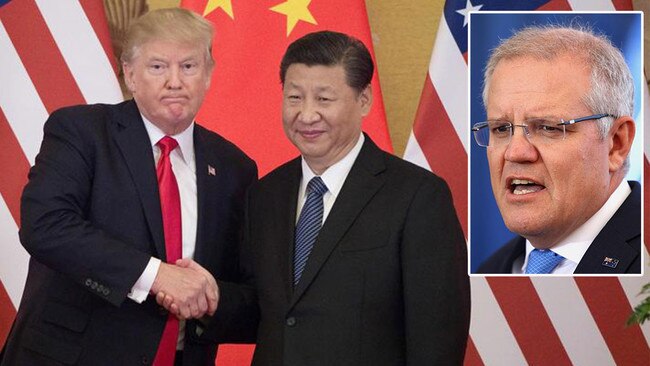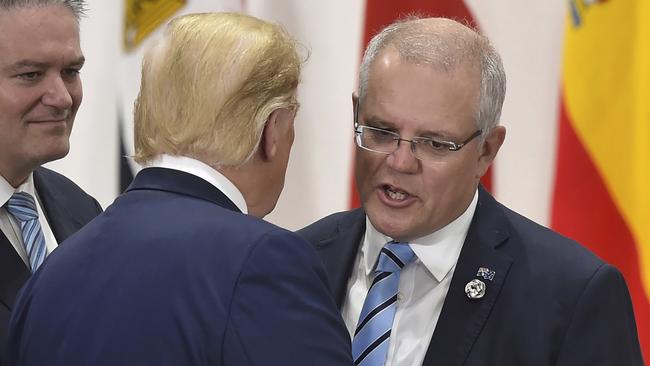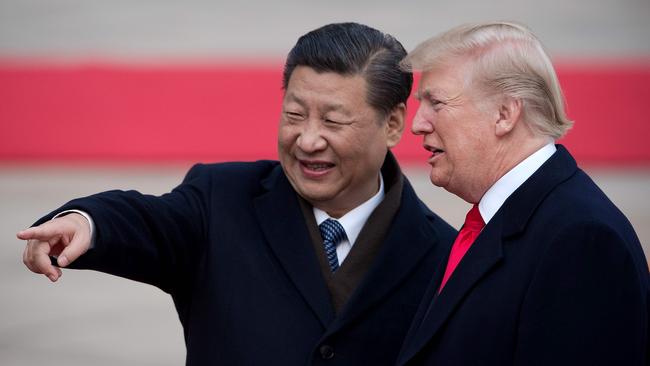
The US is now involved in a strategic rivalry with China that spans trade, technology, finance, military and foreign policy dimensions. The Morrison government acknowledges this. The era when mutual gain defined US-China relations is finished. This is not just a Donald Trump conclusion but, to a large extent, an American conclusion.
Australians might wish this had never happened. But our role is to manage the world that exists, not the world of our dreams. Australian leaders and institutions pretending nothing has changed and that relations with China will sail forward on smooth waters indulge in fantasy.
The reality is obvious: Australia is being squeezed in the growing US-China rivalry. And it is being squeezed by both sides. Our relations with China are diminished, weak at ministerial level and subject to selected Chinese retaliation. Our alliance with the US is deepening, but deepening with a re-energised purpose — the Americans are recruiting Australia as part of their comprehensive rivalry with China.

What happened this week at the US-Australia ministerial talks was startling — US Secretary of State Mike Pompeo and new Defence Secretary Mark Esper lodged more demands on Australia. The Americans are squeezing the Morrison government ahead of Scott Morrison’s Washington visit to meet Trump.
The irony is acute. For years Australia has wanted more US engagement in the region and our fear when Trump won the White House was of US isolationism. But Trump’s lieutenants now send a different message with new risks — Trump’s big play is challenging China and they want Australia aligned in this cause.
America and China will never be equal partners for Australia. The US is and will remain our chief security partner and China will remain our most important trade partner. Yet Australia faces real but contrasting problems in dealing with both.
China is an assertive power ready to use economic seduction and military intimidation in its quest for regional primacy while its authoritarian model and hostility towards democratic values — the latest flashpoint being Hong Kong — are becoming a more serious affront in its conduct with other nations.
John Howard’s warning this week is pertinent. He said Australia’s ties with China were becoming more difficult because the leadership was “a lot more authoritarian than the one that was in power 10 years ago”. China is moving away from freedom towards a hi-tech system of people control. In an adventurous remark Howard suggested that the struggle over Hong Kong “perhaps represents a glimpse of the future for Chinese society”.
Yet Trump is a high-risk alliance partner for Australia. His “America First” doctrine aims to dismantle the global model of US leadership, strategic alliances, open trade, economic interdependence and liberal international principles that have delivered unprecedented prosperity and much stability since 1945. Australia’s national interest has been built on the foundations of this system.
Trump has corrupted political conservatism in the West. He has cast doubt on US security guarantees by attacking almost every major US alliance from NATO to Japan to South Korea. He has ignited a trade, technological and now a currency conflict with China that damages the global economy. This repudiates the type of US leadership that Australia needs.
Pompeo came to Australia with two messages. The first was reassurance given the disruptive antics of Trump, with Pompeo declaring the US as a Pacific power is “here to stay” and the alliance with Australia is unbreakable. In short, the working life of the alliance is broader and deeper than ever and Australia should abandon any fears that the US has become unreliable. The second message was regearing the alliance to serve US rivalry with China. Pompeo criticised past US leaders for being “asleep at the switch” as China reverted to bad behaviour.

He identified such Chinese behaviour — its “efforts to steal data across networks or militarise the South China Sea, something President Xi promised the world he would not do, or engage in activities where they foist money on nations that are desperate for resources and leave them trapped in debt positions” that are about political control.
Reinforcing this message, Esper said: “We stand firmly against a disturbing pattern of aggressive behaviour from China. This includes weaponising the global commons, using predatory economics and debt for sovereignty deals and promoting the state-sponsored theft of other nations’ intellectual property.
“The US will not stand by idly while any one nation attempts to reshape the region to its favour at the expense of others and we know our allies and partners will not either.”
These public comments gave our ministers little room to move. Here was the Trump administration asking more from allies. In case anybody missed the point, the Americans put two issues up in lights — the US wants Asian region locations for new intermediate-range missiles and it wants all nations with commercial interests in the Strait of Hormuz to participate in protecting the waters.
It was only at Sunday night dinner at Aria restaurant that Defence Minister Linda Reynolds asked Esper directly: was the US asking Australia to host the missiles and did it have plans to ask? The answer, evidently, was no. Reynolds and the Prime Minister drop-kicked the idea the next morning in interviews. The relief was palpable. Today’s drama in the Gulf is Iran’s retaliation after Trump’s unwise withdrawal of the US from the Iran nuclear deal. Australia’s instinct will be to make a commitment to advance the principle of free navigation (vital for us in East Asia) but that must depend on a substantial coalition of nations and appropriate rules of engagement.
The task for the Morrison government now is to work constructively with the US on the ambitious agenda of regional strategic co-operation outlined in the joint declaration following the AUSMIN talks. Australia, have no doubt, is moving into a deepening of the US alliance infrastructure with both partners agreeing the alliance is “more vital than ever”.
Payne offered the unqualified remark — without strong US engagement the region that Australia wants cannot be achieved.
But the deepening alliance necessitates an awareness of where Australian and American interests diverge and the heart of this lies in Pompeo’s assertion that economic issues and security issues cannot be separated.
He said the capacity of the People’s Liberation Army was the “direct result” of China’s unfair trade practices and its stealing of technology — hence the justification for Trump’s trade and technology war with China. In short, the economic conflict is integral to the strategic conflict.
This is not Australia’s experience. It is not how Australia thinks. It is not how Australia can afford to think. It does not align with our national interest. While Trump’s critique is partly correct his “solution” is damaging to the world economy and to us.
To grasp the fundamental nature of this difference just read Morrison’s June foreign policy speech where he points out the benefits of China’s rise, the need for US-China trade differences to be resolved “in a way that reinforces our open and inclusive global trading system” and said Australia believed in trade based on rules, not coercion.
During his recent visit to China, Trade Minister Simon Birmingham said Trump’s latest tariff threats against China were “disappointing” and constituted another strike against global growth.
Morrison will not sign up to Trump’s trade war. No responsible Australian government would.
Yet this goes to the heart of Trump’s world view, his rivalry with China and his conception of national power. Trump sees power in unilateral, mercantilist, zero-sum terms, but that is not how power really works in the contemporary age.
It constitutes a wedge between US and Australian national policies. When Morrison meets Trump his aspiration will be to deepen bilateral ties and shared regional strategy, but the task for Australian leadership in harmonising our interests between the US and China gets tougher every day.




The dilemma of Australia’s foreign policy is known but unspoken by government — we are deepening our great alliance with America through the Trump administration that repudiates the past models of US global leadership, interdependent prosperity and astute management of alliances.